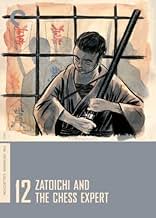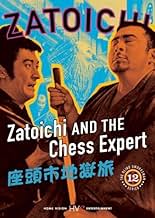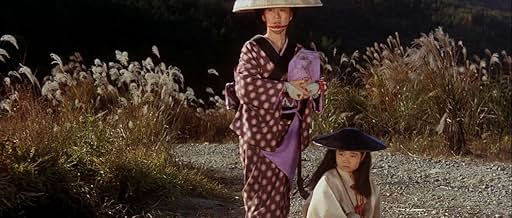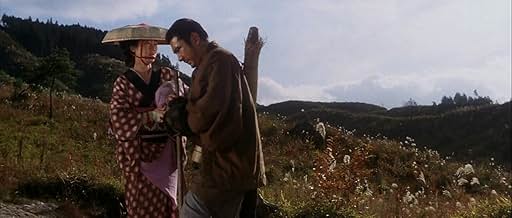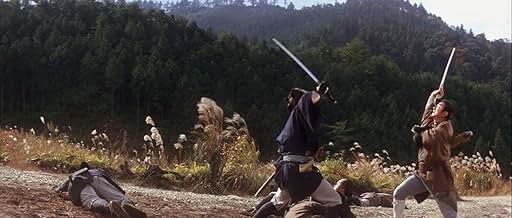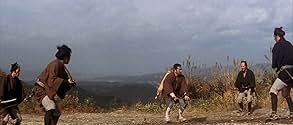IMDb RATING
7.3/10
1.7K
YOUR RATING
A samurai with a high skill in chess makes friends with Zatoichi, who finds that things become peculiar in his presence.A samurai with a high skill in chess makes friends with Zatoichi, who finds that things become peculiar in his presence.A samurai with a high skill in chess makes friends with Zatoichi, who finds that things become peculiar in his presence.
- Director
- Writers
- All cast & crew
- Production, box office & more at IMDbPro
Featured reviews
If you don't like reading subtitles, or you don't like to watch foreign movies, and you don't have a fondness of Samurai sword action drama...don't read any further as its not for you!
A Japanese Chambara (sword fighting) film directed by Kenji Misumi and starring Shintaro Katsu as the blind masseur Zatoichi. It was originally released by the Daiei Motion Picture Company. Zatoichi and the Chess Expert is the twelfth episode in the 26-part film series devoted to the character of Zatoichi. It has also been known as Showdown for Zatoichi and Zatoichi's Trip to Hell.
Its an intricate tale of a blind expert swordsman, who travels the land as a masseur. He makes friends with a dangerous chess player, while fending off angry yakuza and bloodthirsty relatives out for revenge, and trying to save a sick child. As the film progresses we are introduced to other characters, some of whom have interweaving connections to both Zatoichi and the chess playing Samurai.
As is usual with the Zatoichi series of films/story's it is cleverly done; as has been done since the very first Chambara film of the early 1940's, '47 RONIN' (which incidently is a favourite of Keanu Reeves, hence the reason he starred in his own retelling of the ancient true story in 2013...a sequel is being made starting early 2021).
A Japanese Chambara (sword fighting) film directed by Kenji Misumi and starring Shintaro Katsu as the blind masseur Zatoichi. It was originally released by the Daiei Motion Picture Company. Zatoichi and the Chess Expert is the twelfth episode in the 26-part film series devoted to the character of Zatoichi. It has also been known as Showdown for Zatoichi and Zatoichi's Trip to Hell.
Its an intricate tale of a blind expert swordsman, who travels the land as a masseur. He makes friends with a dangerous chess player, while fending off angry yakuza and bloodthirsty relatives out for revenge, and trying to save a sick child. As the film progresses we are introduced to other characters, some of whom have interweaving connections to both Zatoichi and the chess playing Samurai.
As is usual with the Zatoichi series of films/story's it is cleverly done; as has been done since the very first Chambara film of the early 1940's, '47 RONIN' (which incidently is a favourite of Keanu Reeves, hence the reason he starred in his own retelling of the ancient true story in 2013...a sequel is being made starting early 2021).
I agree with the positive remarks left by others about the overall charm of this movie, but the real treasure is actor Mikio Narita (January 31, 1935-April 9, 1990.) He was one of the better character actors of his generation, which is obvious when you compare this performance to his portrayal of an effete imperial minister, who happens to be deadly with a sword, in "Shogun's Samurai", a/k/a "The Yagyu Clan Conspiracy." As Jumonji, Narita borrowed Sam Spade's unique gesture from "The Maltese Falcon," that is, when contemplating a problem, he rubs the side of his nose and then snaps his fingers when inspired with a solution. The script gives him plenty of opportunities to emerge as a full and unforgettable character, and his presence in this episode of the Zatoichi franchise is reason enough to see this film.
Good combination of humor, action and a couple of twists (although if one watches enough of the Zatoichi movies, twists should be expected). I especially thought in this movie, Zatoichi came across more human and not just the guy that hides his cleverness through bumbling. Things to watch for: Zatoichi hustling the dice players but also failing at his own game, the battle in the swamp with his desperate search for the box of medicine and not one but two suspenseful battles at the end. His discussion with the chess expert on fighting was also insightful. There are swordfights and these last a little longer than the earlier movies but no geysers of blood or decapitated limbs so stay away if you are looking for that.
There's little to recommend about this cheaply made samurai film. The films of this genre boast great patience, but within that patience there ought to be at least a few good samurai battles. There are only two real battles in this one. The first one has a neat setting, but it takes place during the night and it is so dark that it is difficult to see anything. The climactic battle, which is actually two consecutive battles, is very good but nothing compared to those in much more well known samurai flicks. The editing of the film is consistently poor and reduces the effectiveness of many of its scenes. This movie is only 90 minutes long, but it feels as long as The Seven Samurai. 5/10.
The state of blindness does not hinder the swordsman masseur, Zato Ichi, in this well-crafted tale of pre-modern Japan, as he is determined to do what is correct by assisting a young girl's recovery from a severe wound suffered in tangential fashion during a sword-fight involving gangsters in the bandit-ridden country. Of the approximately 25 Zato Ichi films, this must rank as one of the better ones, as Shintaro Katsu who portrays the sightless samurai during the entire series, permits us to see more of the inner man behind the warrior facade, aided by an interesting story written by Kan Shimozawa, who contributes the most complex scenarios of this group of works. In early civilized Japan, all masseurs were blind, as then they could not look upon the bodies of their clients, and Zato Ichi ("Ichi the Masseur") is following this tradition, but he is as well an inordinately successful warrior with his cane sword, mastering with cold aplomb each challenge by aggressors, no matter how many they might be. Ichi is a prototypical loner who makes his way in this work, as in all others, by massaging, while handsomely adding to his income through his cheating skills at gambling, since he is also an inveterate confidence man, yet one who makes mistakes and these errors in judgement serve in strengthening his accessibility to the viewer. There is a pleasingly intricate plot, which places Ichi as a travelling companion of an itinerant samurai named Jumonji, played well by Mikio Narita in his first cinematic role, who is the chess expert of the English language title, and the two interact with several other groups of characters in a neatly-woven narrative. The complicated scenario is capably handled by veteran director of samurai motion pictures, Kenji Misumi, who later added other outstanding Zato Ichi films to this first one in his list, as he balances the interwoven dramatics neatly and nicely. Reasons for the societal and artistic success of this series are manifest in this film, wherein Ichi represents values that most peoples are struggling to identify and capture, with the blind swordsman becoming an iconic figure as he stumbles and totters, rather than riding, into the sunset, after completing his clash with evil.
Did you know
- TriviaThis is the twelfth of 26 films to star Shintaro Katsu as Zatoichi
- ConnectionsFollowed by La légende de Zatoïchi - La vengeance (1966)
- How long is Zatoichi and the Chess Expert?Powered by Alexa
Details
- Release date
- Country of origin
- Language
- Also known as
- Zatoichi and the Chess Expert
- Production company
- See more company credits at IMDbPro
- Runtime1 hour 27 minutes
- Aspect ratio
- 2.35 : 1
Contribute to this page
Suggest an edit or add missing content

Top Gap
By what name was La Légende de Zatoïchi : Voyage en enfer (1965) officially released in India in English?
Answer
